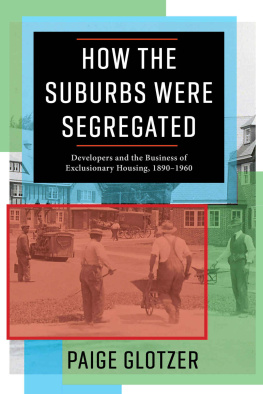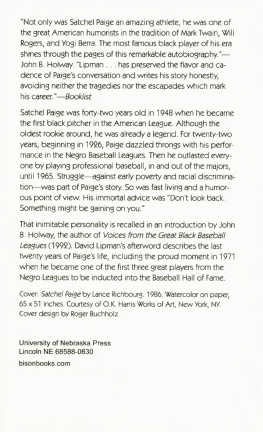Paige Glotzer - How the Suburbs Were Segregated
Here you can read online Paige Glotzer - How the Suburbs Were Segregated full text of the book (entire story) in english for free. Download pdf and epub, get meaning, cover and reviews about this ebook. year: 2020, publisher: Columbia University Press, genre: Politics. Description of the work, (preface) as well as reviews are available. Best literature library LitArk.com created for fans of good reading and offers a wide selection of genres:
Romance novel
Science fiction
Adventure
Detective
Science
History
Home and family
Prose
Art
Politics
Computer
Non-fiction
Religion
Business
Children
Humor
Choose a favorite category and find really read worthwhile books. Enjoy immersion in the world of imagination, feel the emotions of the characters or learn something new for yourself, make an fascinating discovery.
- Book:How the Suburbs Were Segregated
- Author:
- Publisher:Columbia University Press
- Genre:
- Year:2020
- Rating:5 / 5
- Favourites:Add to favourites
- Your mark:
- 100
- 1
- 2
- 3
- 4
- 5
How the Suburbs Were Segregated: summary, description and annotation
We offer to read an annotation, description, summary or preface (depends on what the author of the book "How the Suburbs Were Segregated" wrote himself). If you haven't found the necessary information about the book — write in the comments, we will try to find it.
How the Suburbs Were Segregated — read online for free the complete book (whole text) full work
Below is the text of the book, divided by pages. System saving the place of the last page read, allows you to conveniently read the book "How the Suburbs Were Segregated" online for free, without having to search again every time where you left off. Put a bookmark, and you can go to the page where you finished reading at any time.
Font size:
Interval:
Bookmark:
HOW THE SUBURBS WERE SEGREGATED
COLUMBIA STUDIES IN THE HISTORY OF U.S. CAPITALISM
COLUMBIA STUDIES IN THE HISTORY OF U.S. CAPITALISM
Series Editors: Devin Fergus, Louis Hyman, Bethany Moreton, and Julia Ott
Capitalism has served as an engine of growth, a source of inequality, and a catalyst for conflict in American history. While remaking our material world, capitalisms myriad forms have alteredand been shaped byour most fundamental experiences of race, gender, sexuality, nation, and citizenship. This series takes the full measure of the complexity and significance of capitalism, placing it squarely back at the center of the American experience. By drawing insight and inspiration from a range of disciplines and alloying novel methods of social and cultural analysis with the traditions of labor and business history, our authors take history from the bottom up all the way to the top.
Capital of Capital: Money, Banking, and Power in New York City, 17842012, by Steven H. Jaffe and Jessica Lautin
From Head Shops to Whole Foods: The Rise and Fall of Activist Entrepreneurs, by Joshua Clark Davis
Creditworthy: A History of Consumer Surveillance and Financial Identity in America, by Josh Lauer
American Capitalism: New Histories, edited by Sven Beckert and Christine Desan
Buying Gay: How Physique Entrepreneurs Sparked a Movement, by David K. Johnson
City of Workers, City of Struggle: How Labor Movements Changed New York, edited by Joshua B. Freeman
Banking on Freedom: Black Women in U.S. Finance Before the New Deal, by Shennette Garrett-Scott
Threatening Property: Race, Class, and Campaigns to Legislate Jim Crow Neighborhoods, by Elizabeth A. Herbin-Triant
Brain Magnet: Research Triangle Park and the Idea of the Idea Economy, by Alex Sayf Cummings
PAIGE GLOTZER
HOW THE SUBURBS WERE SEGREGATED
Developers and the Business of Exclusionary Housing, 18901960
Columbia University Press/New York

Columbia University Press
Publishers Since 1893
New YorkChichester, West Sussex
cup.columbia.edu
Copyright 2020 Columbia University Press
All rights reserved
E-ISBN 978-0-231-54249-4
Library of Congress Cataloging-in-Publication Data
Names: Glotzer, Paige, author.
Title: How the suburbs were segregated : developers and the business of exclusionary housing, 18901960 / Paige Glotzer.
Description: New York : Columbia University Press, [2020] | Includes bibliographical references and index.
Identifiers: LCCN 2019043862 (print) | LCCN 2019043863 (ebook) | ISBN 9780231179980 (cloth) | ISBN 9780231179997 (paperback)
Subjects: LCSH: Discrimination in housingMarylandBaltimoreHistory20th century. | Housing policyMarylandBaltimoreHistory20th century. | SuburbsMarylandBaltimoreHistory20th century.
Classification: LCC HD7288.76.U52 B34 2020 (print) | LCC HD7288.76.U52
(ebook) | DDC 363.5/109752609041dc23
LC record available at https://lccn.loc.gov/2019043862
LC ebook record available at https://lccn.loc.gov/2019043863
A Columbia University Press E-book.
CUP would be pleased to hear about your reading experience with this e-book at .
Cover design: Noah Arlow
To my grandfather, Milton Glotzer, for inspiring my love of history
CONTENTS
I began the acknowledgments to my doctoral dissertation by saying, It takes a village. I could not imagine then just how that village would continue to grow as I transformed the dissertation into a book. One postdoctoral fellowship, one tenure-track job, and four moves later, I owe a deep debt of gratitude to the many people who helped bring this project to fruition.
There would be no book without the tireless editors at Columbia University Press. Louis Hyman and Philip Leventhal took a chance by offering me a contract when I was still a graduate student. Bridget Flannery-McCoy went so far above and beyond her job to help me revise that it is embarrassing to recall the initial drafts I thought would pass muster. Stephen Wesley shepherded the book through the production process. The book also benefited enormously from the editors of the Columbia Studies in the History of U.S. Capitalism series, Devin Fergus, Louis Hyman, Bethany Moreton, and Julia Ott. Thank you, too, to the readers who saw the manuscripts promise.
I have been fortunate to land at the University of WisconsinMadison as the first assistant professor and John W. and Jeanne M. Rowe Chair in the History of American Politics, Institutions, and Political Economy. Thank you to the Rowes for their generous and continued support of the history department. At UW I have the pleasure of working with some of the best historians in the world. It has been great to learn that these colleagues, formerly just names on the covers of books to me, are as kind and welcoming as they are rigorous and prolific. A special thank-you is in order for Verenize Arceo and James Meadows; our conversations have reminded me to stay focused on my scholarly commitment to center the experiences of people, no matter how much I am discussing companies and policy. Support for this research was provided by the University of WisconsinMadison Office of the Vice Chancellor for Research and Graduate Education with funding from the Wisconsin Alumni Research Foundation. In addition, a First Book Award from the Center for the Humanities at the University of WisconsinMadison allowed me to workshop the manuscript and improve it considerably. Thank you to Megan Massino and the centers former director, Gregg Mitman, for running the First Book Program, and to the workshop participants Nan Enstad, Stephen Kantrowitz, Nancy Kwak, Thomas Sugrue, and Monica M. White.
Before I came to UW, the Harvard University Joint Center for History and Economics gave me the opportunity to focus full-time on the book as a Prize Fellow in Economics, History, and Politics. (I clearly tend to gravitate to positions with long titles.) Thank you to Sunil Amrith and Emma Rothschild, and to senior fellows Abhijit Banerjee, Walter Johnson, Charles E. Rosenberg, Amartya Sen, and Richard Tuck. A weekly highlight at the center was the cross-disciplinary conversations over lunch with Shane Bobrycki, Namrata Kala, Nikhil Naik, Anne Ruderman, Evan Sadler, and Melissa Teixeira. Jennifer Nickerson is the glue that holds the center together on a daily basis.
The Joint Center for History and Economics generously supports the digital project that accompanies this book, Building Suburban Power, as part of its Visualizing Historical Networks site. That project would have been impossible if not for Ye Seul Byeons talent with databases, coding, and site design. Stacy Bogan at the Harvard Center for Geographic Analysis did initial work to clean up my data and make maps. Ian Kumekawa continues to be the point person for the site and Amy Price maintains it.
I have had the pleasure of being trained by amazing advisors. N. D. B. Connolly changed the way I think about the world. Mary Ryan and Angus Burgin sharpened and broadened my intellectual interests. If not for their mentorship, I do not know what type of scholarwhat type of personI would be today.
A historian cannot do anything without archivists and librarians. I learned this first and foremost at the Johns Hopkins Sheridan Libraries Special Collections, where this book began as a work opportunity to process the Roland Park Company records the summer before I began graduate school. Jordon Steele taught me how to process the Roland Park Company records and developed a vision for making the collection accessible to the public. Valerie Addonizio did most of the work to process the records, which was no easy task as company officials left everything to posterity except a guide to their filing system. It was also always a pleasure to work with Paul Espinosa, Heidi Herr, Amy Kimball, Jerome Powell, and James Stimpert. Cynthia Requardt hired me on the spot during prospective student weekend and recommended that I contact her colleague Margaret Burri to find a place to live.
Next pageFont size:
Interval:
Bookmark:
Similar books «How the Suburbs Were Segregated»
Look at similar books to How the Suburbs Were Segregated. We have selected literature similar in name and meaning in the hope of providing readers with more options to find new, interesting, not yet read works.
Discussion, reviews of the book How the Suburbs Were Segregated and just readers' own opinions. Leave your comments, write what you think about the work, its meaning or the main characters. Specify what exactly you liked and what you didn't like, and why you think so.











